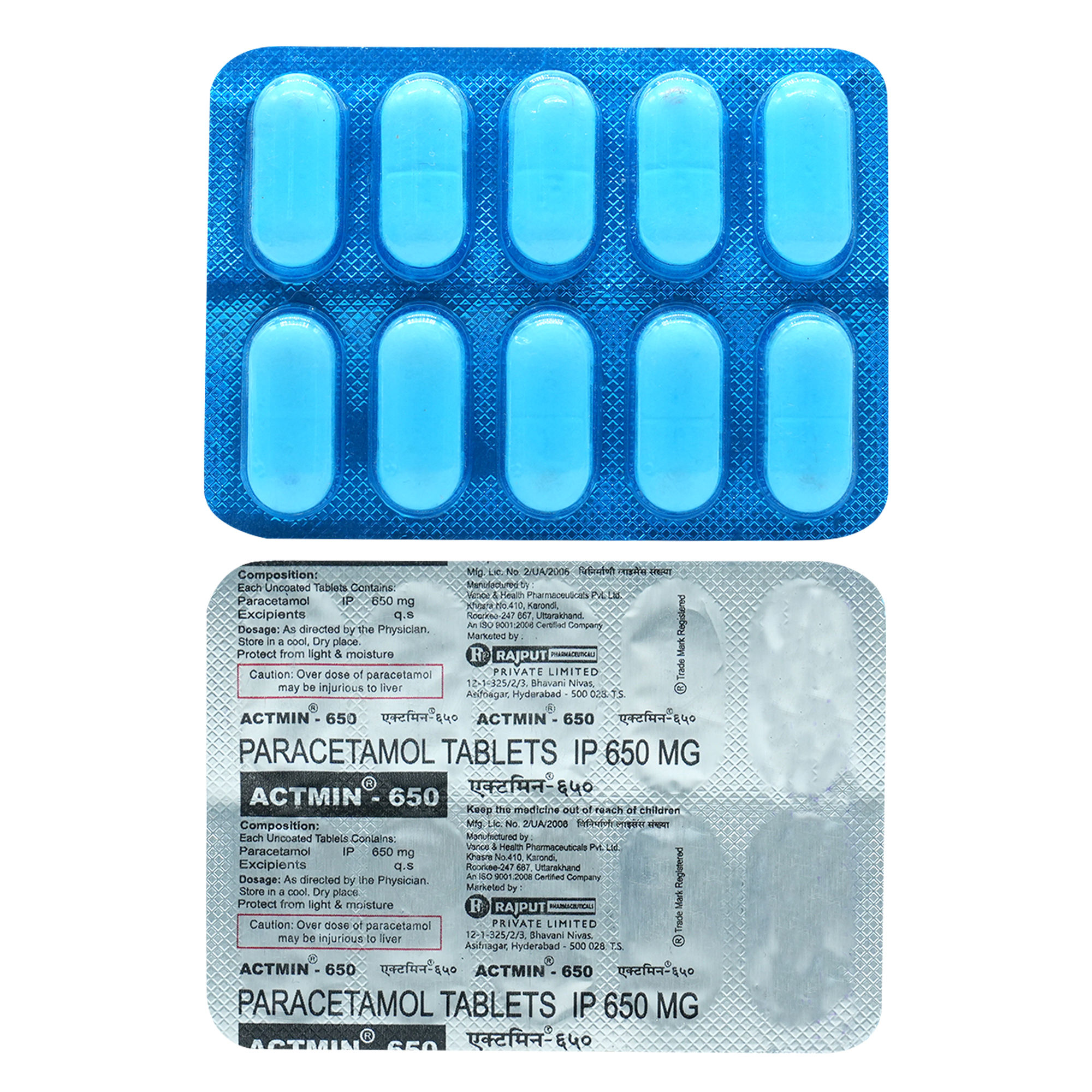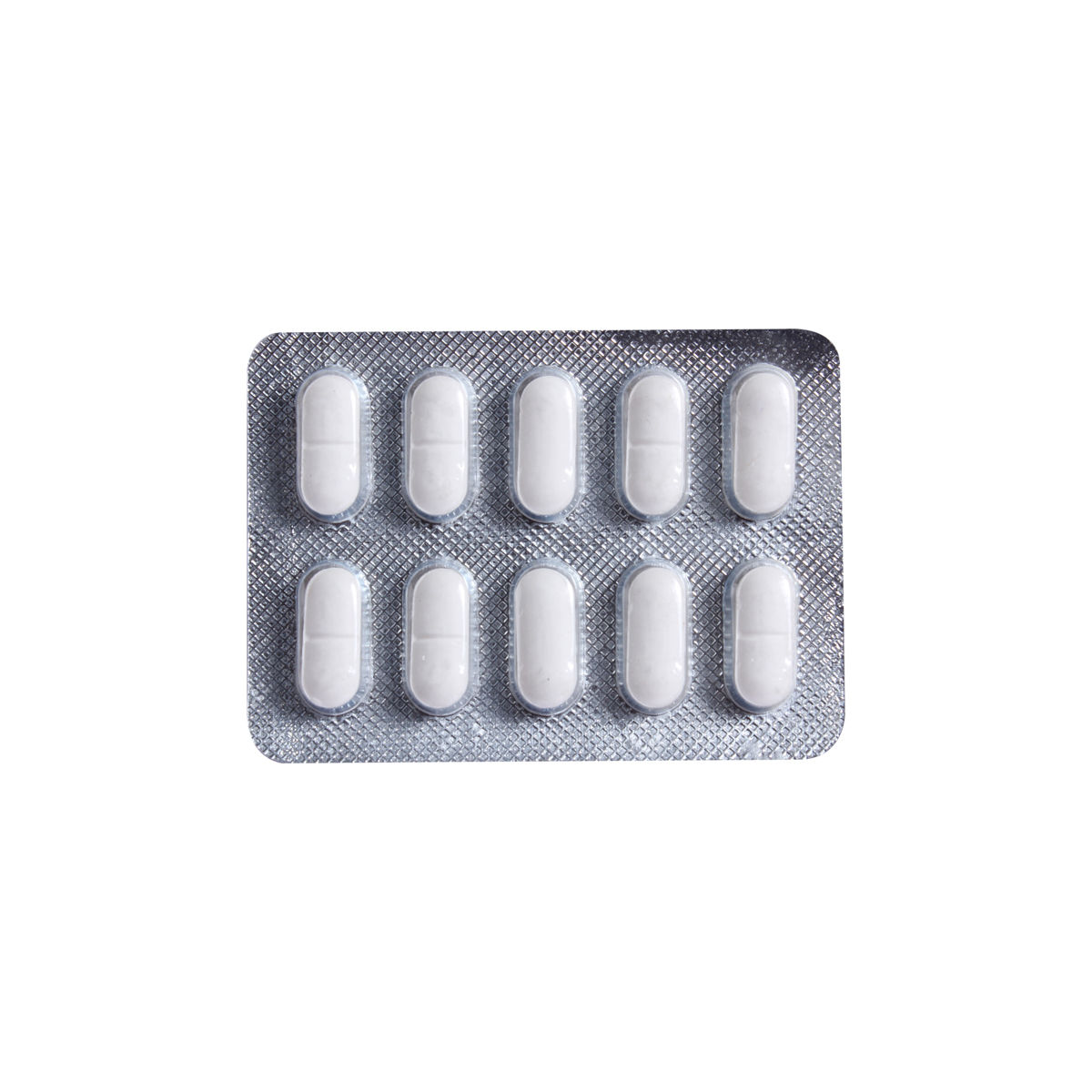Acetaminophen
About Acetaminophen
Acetaminophen belongs to the group of medicines called analgesics (pain killers), and antipyretics (fever-reducing agents) used to reduce fever and treat mild to moderate pain. Also, it is used to relieve headaches, migraine, toothache, period pain, back pain, muscle pain and rheumatic pains. Pain and fever are caused by the activation of pain receptors due to the release of certain natural chemicals in the body, like prostaglandin.
Acetaminophen contains acetaminophen that works by inhibiting the production of certain chemical messengers in the brain known as prostaglandins. Thus, reducing pain. Also, Acetaminophen affects an area of the brain that regulates body temperature known as the hypothalamic heat-regulating centre. Thereby it reduces fever.
Take Acetaminophen as recommended. In some cases, Acetaminophen may cause side effects such as nausea, stomach pain and dark-coloured urine. Most of these side effects of Acetaminophen do not require medical attention and gradually resolve over time. However, if the side effects persist or worsen, please consult your doctor.
Do not take Acetaminophen if you're allergic to any ingredient in it. Acetaminophen is not recommended for children below six years of age. If you are pregnant or breastfeeding, please consult a doctor before using the Acetaminophen. Avoid alcohol consumption with Acetaminophen as it may increase the risk of liver damage. If you have an impaired nutritional state caused by anorexia (eating disorder), malnutrition or alcohol abuse or if you are dehydrated, inform your doctor before taking the Acetaminophen.
Uses of Acetaminophen
Medicinal Benefits
Acetaminophen contains acetaminophen, an analgesic (pain killer) and antipyretic (reduces fever). It inhibits the production of certain chemical messengers in the brain known as prostaglandins. Thus, reducing pain. Also, Acetaminophen affects an area of the brain that regulates body temperature known as the hypothalamic heat-regulating centre. Thereby, it reduces fever.
Directions for Use
Storage
Side Effects of Acetaminophen
- Nausea
- Stomach pain
- Dark coloured urine
Drug Warnings
Do not take Acetaminophen if you're allergic to any ingredient in it. Caution should be exercised while using Acetaminophen in children. If you are pregnant or breastfeeding, please consult a doctor before using Acetaminophen. Avoid alcohol consumption with Acetaminophen as it may increase the risk of liver damage. If you have an impaired nutritional state caused by anorexia (eating disorder), wrong nutrition or alcohol abuse or if you are dehydrated, inform your doctor before taking Acetaminophen. Avoid taking more than recommended doses as it may increase the risk of serious liver damage.
Drug Interactions
Drug-Drug Interactions: Acetaminophen may interact with blood thinners (warfarin), cholesterol-lowering drugs (cholestyramine), analgesics (aspirin), antibiotics (chloramphenicol, rifampicin), anti-gout medicines (probenecid), antitubercular drug (isoniazid), anticonvulsants (lamotrigine, carbamazepine, phenytoin), and anti-nausea agents (metoclopramide, domperidone).
Drug-Food Interactions: Acetaminophen may interact with St. John’s wort (herbal medicine to treat depression). Avoid foods rich in carbohydrates and pectin, including jellies, cabbage, Brussels sprouts and broccoli as Acetaminophen may interact with these foods. Also, avoid intake of alcohol with Acetaminophen as it may increase the risk of liver damage.
Drug-Disease Interactions: If you have kidney or liver disease, hepatitis, Gilbert's syndrome (a liver condition), hemolytic anaemia (abnormal breakdown of red blood cells), G-6-PD deficiency (a hereditary condition resulting in low red blood cell counts), blood poisoning, inform your doctor before taking Acetaminophen.
Drug-Drug Interactions Checker List:
Safety Advice

Alcohol
unsafeAlcohol should not be consumed with Acetaminophen as it may damage your liver and lead to excessive drowsiness or dizziness.

Pregnancy
consult your doctorPlease consult a doctor if you are pregnant or planning for pregnancy before using Acetaminophen. Your doctor may recommend the lowest dose of Acetaminophen and for the shortest duration if you are pregnant.

Breast Feeding
consult your doctorOnly consume Acetaminophen, if you are recommended by a doctor.

Driving
safeCan be safely taken, Acetaminophen usually does not affect driving ability.

Liver
cautionAcetaminophen to be taken with caution, especially if you have a history of liver diseases/conditions. The dose may have to be adjusted by your doctor.

Kidney
cautionAcetaminophen to be taken with caution, especially if you have a history of Kidney diseases/conditions. The dose may have to be adjusted by your doctor.

Children
consult your doctorAcetaminophen can be given safely to children provided a child specialist has recommended the dose.
Habit Forming
Diet & Lifestyle Advise
Get adequate sleep as resting the muscles can help in reducing inflammation and swelling.
Follow heat or cold therapy, apply a cold or hot compress on the joints for 15-20minutes regularly.
Acupuncture, massage and physical therapy may also be helpful.
Eat foods rich in antioxidants such as berries, spinach, kidney beans, dark chocolate, etc.
Foods containing flavonoids such as soy, berries, broccoli, grapes and green tea help in reducing inflammation.
Maintain a healthy weight by performing regular low-strain exercises and eating healthy food.
Avoid smoking and alcohol consumption.
Special Advise
If you have a high fever or signs of infection after using Acetaminophen for more than three days or if pain persists after using Acetaminophen for more than five days, please consult a doctor.
Patients Concern
Disease/Condition Glossary
Fever: Fever is an abnormal increase in body temperature due to infection, chemotherapy, or various disease condition. If the body temperature is 98.6°F, it is normal, and if it goes above 100.4°F (38℃), it is called fever or pyrexia. Body temperature increases in response to infection or varied problems to protect the body. Flu is one of the most common causes of fever.
Pain: Pain is a term used to describe any unpleasant feeling or discomfort. It occurs due to nerve damage (in cases of backache, toothache, or muscle pain) or persistent stimulation (in headaches or migraine). Pain may vary from mild to severe, depending on the underlying condition.
FAQs
Acetaminophen is used to reduce fever and treat mild to moderate pain. Also, it is used to relieve headaches, migraine, toothache, period pain, back pain, muscle pain and rheumatic pains.
Acetaminophen works by inhibiting the production of certain chemical messengers in the brain known as prostaglandins. Thus, reducing pain. Also, Acetaminophen affects an area of the brain that regulates body temperature known as the hypothalamic heat-regulating centre. Thus, it reduces fever.
You are not recommended to take Acetaminophen with warfarin as co-administration of these two medicines may increase the risk of bleeding more easily. However, if you are supposed to use these medicines together, you are advised to contact your doctor so that the dose may be adjusted appropriately to use safely.
Acetaminophen may affect how certain tests work such as blood sugar test and uric acid test. Therefore, if you are about to undergo blood test or any laboratory tests, inform your doctor or lab technician that you are taking Acetaminophen.
You are not recommended to take Acetaminophen with other paracetamol containing products as it may cause paracetamol overdose.
If you take more than recommended doses of Acetaminophen, it may cause overdose and lead to serious liver damage. The symptoms of overdose include vomiting, loss of appetite, stomach pain, paleness and nausea. However, if you notice any of these symptoms while taking Acetaminophen, please consult a doctor immediately.
Yes, excessive intake or prolonged intake of Acetaminophen can damage your liver. Do not exceed a daily dose of more than 4 gm.
To ensure safe usage of Acetaminophen, follow these simple steps. Take the recommended dose, never take an overdose, and inform your doctor if you become pregnant while using this medication. Monitor your body's response and report any side effects. Also, avoid consuming alcohol while taking this medication. By following these guidelines, you'll maximize the benefits of Acetaminophen and protect your health.
Acetaminophen provides temporary relief from headaches, but it doesn't address the underlying cause. Your doctor will help identify the underlying issue and recommend targeted treatment for effective and lasting relief.
Acetaminophen can relieve cold-related symptoms such as sore throat, headache, earache, and lower fever. Remember, Acetaminophen is only meant to help manage symptoms, not cure the underlying illness.
If you vomit after taking Acetaminophen, don't panic. Simply take your next dose and continue with your regular schedule. Try to observe whether the tablet or another reason caused the vomiting. If you vomit again after the next dose, stop taking the medication and consult your doctor to determine the cause and find appropriate management.
Generally, Acetaminophen is used to treat fever and provide pain relief. Feeling better can vary based on factors such as the dose, the severity of your condition, and how your body responds to the medication.
Take Acetaminophen every 6-8 hours as needed to relieve fever and pain. However, do not take it for more than 3 days. If your symptoms persist or worsen, stop taking Acetaminophen and consult a doctor for proper treatment.
Some babies may become sleepy or relaxed after taking Acetaminophen (the recommended dose as directed by the doctor), while others won't. Monitor your baby's behavior and consult your pediatrician if you have any concerns or need to adjust their dosage.
Acetaminophen is generally safe for children when used correctly and in the recommended dosage. However, following the recommended dosage guidelines and consulting with a paediatrician before administering it to your child is essential. Always read the label carefully, and be aware of the risks of overdose or potential interactions with other medications.
No, Acetaminophen is not an antibiotic. It does not fight against the bacteria. It is a pain reliever and fever reducer commonly used to treat mild to moderate pain and reduce fever.
You can take Acetaminophen and ibuprofen together under the guidance of a doctor. There is no known drug interaction between them, but both medications work to relieve pain. It's essential to consult a doctor to find the best medication that suits your health status and avoid any potential complications.
The working of Acetaminophen for you may vary based on factors such as the dose, the severity of your condition, and how your body responds to the medication. Generally, when taken orally, Acetaminophen typically starts working within 15 to 30 minutes. You may begin to feel relief from pain and fever shortly after taking it. Depending on the individual and the formulation used, the effects can last for about 4 to 8 hours.
Taking an excess of Acetaminophen can lead to serious side effects, including liver damage, kidney failure, and even death. Always follow the exact recommended dose and never exceed it. If your condition does not respond to the current dose, consult your doctor for advice to avoid potential complications.
Acetaminophen in rare cases may cause nausea and vomiting in some individuals as it is reported as a common side effect. However, these symptoms vanish as your body adjusts to the medication. If these symptoms become worse, please consult a doctor for relief.
Acetaminophen is not typically used to relieve stomach pain due to indigestion. It is more effective for pain relief and fever reduction. For indigestion-related stomach pain, antacids or other medications specifically designed to treat indigestion might be more appropriate. It's best to consult your doctor for the most suitable treatment.
Yes, you can take Acetaminophen with antibiotics only under a doctor's suggested. Acetaminophen may interact with the antibiotic. Dose adjustment is required to avoid negative complications. Always follow the doctor's advice for appropriate treatment.
The common side effects of the Acetaminophen are nausea, stomach pain, and dark-colored urine. However, these symptoms vanish as your body adjusts to the medication. If these symptoms become worse, please consult a doctor for relief.










